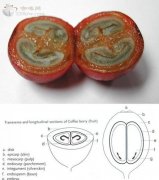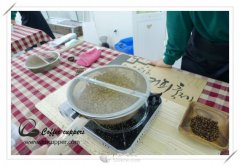The whole process of coffee roasting technology
Coffee roasting (coffee roasting) refers to the heating of raw beans to convert starch in raw beans into sugars and acids at high temperature, cellulose and other substances will be carbonized to varying degrees, water and carbon dioxide will be volatilized, protein will be converted into enzymes and fats, and the remaining substances will be combined to form an oil film on the surface of coffee beans, and in this process will produce sour, bitter, sweet and other flavors of coffee. The process by which raw beans are converted into dark brown beans by forming a mellow degree and hue. Because a variety of small changes in temperature, heat and other small changes in the baking process can change the taste of beans, different beans have different characteristics, and baking is a fast operation in a short time, so it is required to accurately budget the baking process and adjust it timely.
The reactions and changes that occur during coffee roasting can be summarized as follows:
1) dry. When the raw coffee beans are heated, the water vapor in the raw beans begins to evaporate. when the temperature is about 135℃, the color of the raw beans begins to change, starting to turn white from green.
2) dehydration. Continue to heat, raw beans from green to light yellow, when the temperature reaches 160℃ or so, will emit the aroma of baked grain, continuous heating, beans become light brown.
3) an explosion. When the temperature is about 190℃, after the dehydration is completed, because the coffee bean is expanded by heat until it breaks into an explosion, a series of thermal decomposition reactions will take place inside the bean, in which the caramelization reaction will bring the sweetness, dark brown and mellowness of the coffee bean, and the explosion will last about 1.5 minutes.
4) second explosion. Continue to heat, into the second explosion, when the beans will have a more violent reaction, and release a lot of heat. With the end of the second explosion, the raw bean has basically turned black, the bean body has expanded to 1.5 times that of the original, the surface is oily, and the weight has been reduced by 12% to 20%. Usually the roasting of coffee beans ends about a minute after the end of the second waterfall at the latest.
Important Notice :
前街咖啡 FrontStreet Coffee has moved to new addredd:
FrontStreet Coffee Address: 315,Donghua East Road,GuangZhou
Tel:020 38364473
- Prev

Coffee knowledge--coffee roasting
1. Dehydration: generally refers to the baking process below 170 degrees, different baking appliances required for dehydration time is different, but usually controlled in 5~8 minutes best, depending on the moisture content of beans and set. 2. Climbing temperature: Usually the temperature climbing speed of baking is controlled between 7 and 14 degrees. This is related to the control of firepower. The better temperature climbing speed is controlled at about 10 degrees. The moisture content of beans is different.
- Next

Coffee roasting net spoon baking
Coffee roasting (coffee roasting) means that through heating raw beans, starch in raw beans is converted into sugars and acids at high temperature, substances such as cellulose will be carbonized to varying degrees, water and carbon dioxide will be volatilized, proteins will be converted into enzymes and fats, and the remaining substances will be combined to form an oil film on the surface of coffee beans, and in the process coffee acids will be formed.
Related
- What is the meaning of lactic acid fermentation with coffee bean treatment?
- How to judge the state of foam by sound?
- How does the latte pull out the unicorn pattern? Come to get for a little trick to improve the flower pull!
- Will flower pulling affect the taste of the latte?
- Do you know the history of coffee?
- The difference between honey treatment and sun washing what is raisin honey treatment?
- What kind of milk can a novice use to make coffee foam to keep the foam longer? The correct method and skills of milking tutorial sharing
- Why do washed coffee beans taste sour? Flavor characteristics of washed Coffee
- Introduction to the skill of how to practice the size and height of water injection around the circle of hand-brewed coffee
- How do beginners practice coffee flower drawing from scratch?

